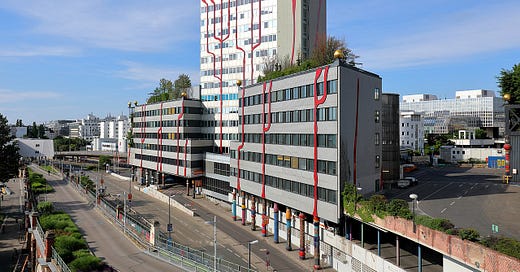Credit Crunch
Six months into Russia's invasion of Ukraine, Wien Energie has become the first Austrian energy provider to ask for a bailout. It will not be the last
Servus!
Last week marked six months since Russian forces launched a large-scale invasion of Ukraine, plunging the region into war. As Ukraine celebrated its Independence Day, Russia fired rockets at a railway station in Chaplyne, an urban settlement about 90 miles east of Donetsk. At least 22 people were killed and 50 injured, according to reports. This week, Ukraine is seeking to turn the tables on Russia, launching a counteroffensive with a view to recapturing territory on the road to the southern port city of Kherson.
In Prague, Europe’s foreign ministers are meeting to discuss the possibility of imposing visa restrictions on Russians. Expected to stop short of an outright ban on new tourist visas for Russians, the European Union may make said visas harder to obtain by suspending a mutual visa facilitation agreement with Russia. While Poland, Finland, and the Baltic states want tough measures against Russian tourists, Austria has been named as among the European countries that are continuing to issue tourist visas to Russians as per normal.
But the topic at the top of Europe’s docket is emergency measures to support and urgent reform of the continent’s energy market. The war in Ukraine has driven electricity prices through the roof. On Friday, “the year-ahead contract for German electricity reached €995 per megawatt hours while the French equivalent surged past €1,100 euros,” the wire service AFP reported. The Financial Times has noted that “Europe’s benchmark electricity price has risen to 10 times its decade-long average, in line with a 14-fold increase in the cost of gas.”
Thank you for being a subscriber to the Vienna Briefing. If you know someone else who might be interested in reading this newsletter, consider sharing it with them today.
Rising wholesale prices is having a knock-on effect on people’s household bills, and Austria’s government has already announced two forms of direct support to domestic energy consumers. The first was an energy certificate worth €150 that can be used against people’s end-of-year bills; the second is a package of one-time bonuses worth €500 per adult and €250 per child, meaning a family of four will receive €1,500 from the government in the coming weeks to offset the rising cost of living.
Government help, however, will not end with consumers alone. Late on Sunday night, Austria’s newspapers began to report that Wien Energie—the country’s largest energy provider with around two million customers and an annual turnover of €3 billion—needed a bailout. The initial figure bandied about was between €1.7 and €1.8 billion. On Monday, the finance ministry claimed Wien Energie may need €6 billion. Wien Energie denied it stood on the edge of insolvency; that same day, Vienna’s finance secretary Peter Hanke came out in favor of the state putting up €10 billion to create a federal support system for energy companies in trouble.
Whether Wien Energie needed €2 billion or €10 billion was no clearer by Tuesday lunchtime, when following negotiations between the City of Vienna and the federal finance and energy ministries, finance minister Magnus Brunner told reporters the company no longer needed an urgent bailout, though did not rule out one becoming necessary in the coming days. ‘The coming days’ turned out to mean Wednesday morning, when Brunner told reporters the federal government was set to offer Wien Energie a €2 billion line of credit to help it withstand fluctations in Europe’s energy market.
The Vienna Briefing is a free newsletter. If you enjoy and would like to support my work, think about buying me a coffee and sending me a tip via PayPal.
Wien Energie is indeed particularly exposed to market forces. Last year, 80 percent of Wien Energie’s electricity production came from fossil fuels, and compared to Austria’s western states like Vorarlberg and Tyrol with their hydroelectric and wind capacity, Vienna has limited scope to produce its own energy. But the City of Vienna—which owns 100 percent of Wien Energie through the Wiener Stadtwerke—have a lot of questions to answer. Why it took so long for Vienna to come clean about the state of Wien Energie’s finances? Why did the City provide the company with two €700 billion lines of credit in July and August and not tell anyone? and did the company ruin itself due to ill-judged speculation on the energy markets? These questions are for federal auditors to investigate.
The federal government is not free of blame here either. Why weren’t federal ministries or regulators aware of Wien Energie’s problems until Sunday? and why hadn’t they anticipated a scenario where energy companies might require federal help in order to stay afloat? Energy minister Leonore Gewessler sought to clarify Tuesday morning that no other Austrian energy company has yet to ask for a bailout. The crucial word there is yet. It is obvious that the turbulent energy markets mean Wien Energie will not be the last company to ask for a cash injection or risk going under. While the Austrian government can provide that financial support, the underlying problems causing this instability can only be mitigated at the European level.
Supporting both consumers and energy companies throughout the winter will be vital for three reasons. In a country with high living standards like Austria, people should not have to live in the cold because they cannot afford to turn on their heating. Deteriorating living standards at home will also weaken Austria and Europe’s resolve to support Ukraine. And I also fear, based on Austria’s experience of the COVID-19 pandemic, that the victor in any scenario where people are struggling to get by will be the political extremes, in particular the far-right. Austria’s political stability, then, depends on the government being able to manage this very difficult winter.
Bis bald!




